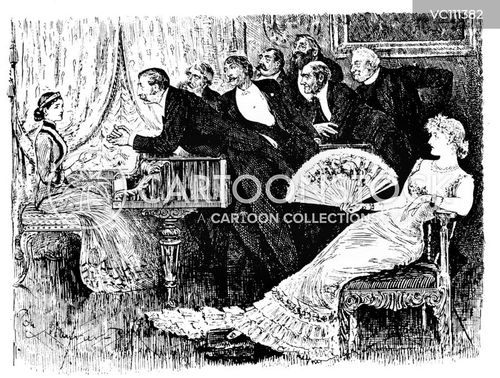Now, I daresay I might be wrong about this.
I have just finished reading A Poisoned Season by Tasha Alexander, a historical fiction/mystery set in the Victorian era. While it isn’t a bad book in itself, I found myself weary from all these tropes that I seem to be uncovering in the 3 recent books of historical fiction I’ve read recently:
1. Main female character is a widow (usually aristocratic).
Lady Emily Ashton in A Poisoned Season, Lady Anne Darby in The Anatomist’s Wife, Christine Derrick (late husband was the son of an earl) in Slightly Dangerous. I suppose that widowhood was the most attractive option for authors to place their heroine. It entailed sexual experience and therefore they could easily explain and do away the stumbling block of shy inexperience that most single unmarried ladies in the Regency/Victorian eras would realistically exhibit. They could easily tune in and recognise as much sexual tension and imagery as an author could possibly want to write into their plot, without worrying about realism. A mature unmarried lady would be looked upon as a spinster and would probably be viewed as unattractive, so widowhood would give authors a good excuse to have a mature, attractive, and – more importantly – available female for sexual exploits.

2. Late husband is unloved and unmourned.
Whether her late husband is a sordid and uncaring man, as is Sir Anthony Darby, the so-called anatomist in The Anatomist’s Wife, or had given to a habit of gambling, as did Oscar Derrick in Slightly Dangerous, the late husband of our main widow is usually unloved at the point of their timely demise. They are usually mourned outwardly, as befits social expectations, but hardly missed. This is a quick way for our main widow to have unengaged affections so the hero, in some guise or other, will be able to captivate her without having to break down the meandering form of potent grief and lingering emotions.
3. There is usually some mystery to solve.
And usually our main widow will find some pressing reason to be the one to solve it, despite that it was highly improper for women at that time to partake in such tedious activities that entailed running around so much. This is excepted in Slightly Dangerous, where our hero solves the mystery.

4. Our main widow is usually a social eccentric.
Because apparently being a widow, you are either promiscuous, or you are a social recluse/eccentric. In the case of the 3 books I’ve read, all the widows’ main objective in life was to defy High Society and to live their life against the grain by shunning the mechanics of High Society. Usually also because they have some all-consuming passion and interest (art, Greek, children) in a subject that made them stand out from the crowd of simpering young women whose only object was to marry the most titled, wealthiest man that would have them. Because they don’t care about men (supposedly, even though they all end up with one by the end of the novel) anymore. And also because they are widows, and therefore it is almost expected of them to behave against the grain. Somehow. Maybe. Although sometimes I wonder if this would be a popular plot device if authors actually knew enough about the complicated machinery of High Society in England at that time period to write about it. Having a widow avoid most forms of social interactions is a pretty easy ticket out.

5. Our main widow usually also has some kind of unsavoury reputation
Being well-respected is for sissies. Widows have to prove their badassery and to proclaim their notoriety by having an unsavoury reputation in Society. Being unnatural because of her husband’s scientific pursuits for Lady Anne Darby, being a flirt for Christine Derrick, and being scandalous for Lady Emily Ashton. But wait! It just won’t do for the widespread rumours of our poor widow to actually be true cos who know if that will scare the hero away? No, all these unfounded rumours are just meant to up our widow’s market value by imbuing notoriety on her honour, but not really actually destroying her innate goodness, so our hero can discover that all by his onesy.
6. Despite her unsavoury reputation, our main widow still gets all the dudes
Because that’s what unsavoury reputations are for! Our main widow, despite being 1) a widow, 2) notorious in Society and 3) hating all kinds of social interactions – still manages to bring all the boys to her yard! Somehow or other, even men notorious for their gallivanting and dalliances find enough in our main widow to want to turn serious for good. For Lady Anne Darby, despite her wanting to hide herself away in a corner of her sister’s castle, she still attracts the two most attractive men of the house party – the handsome rake, also son of an earl, whom every lady in society wants to bed, and our main hero, a wealthy gentleman, Mr. Gage. For Christine Derrick, most of the men in the house party are attracted to her, most of all our main hero, Wulfric, Duke of Bewcastle. She is almost proposed marriage to by the Earl of Ketridge. What a snatch! For Lady Emily Ashton, a pretender to the French throne, a cat burglar with stalker tendencies and a renowned flirt who is also a duke all want to bed her or marry her. That is not even counting the main hero in that story, Mr Hargreaves, who happens also to be one of the richest men in England. Well, well. Widows have all the luck.

It was fun at first, but the next time I read any historical fiction that answers all these tropes again, I think I may just give up within the first 10 pages.
